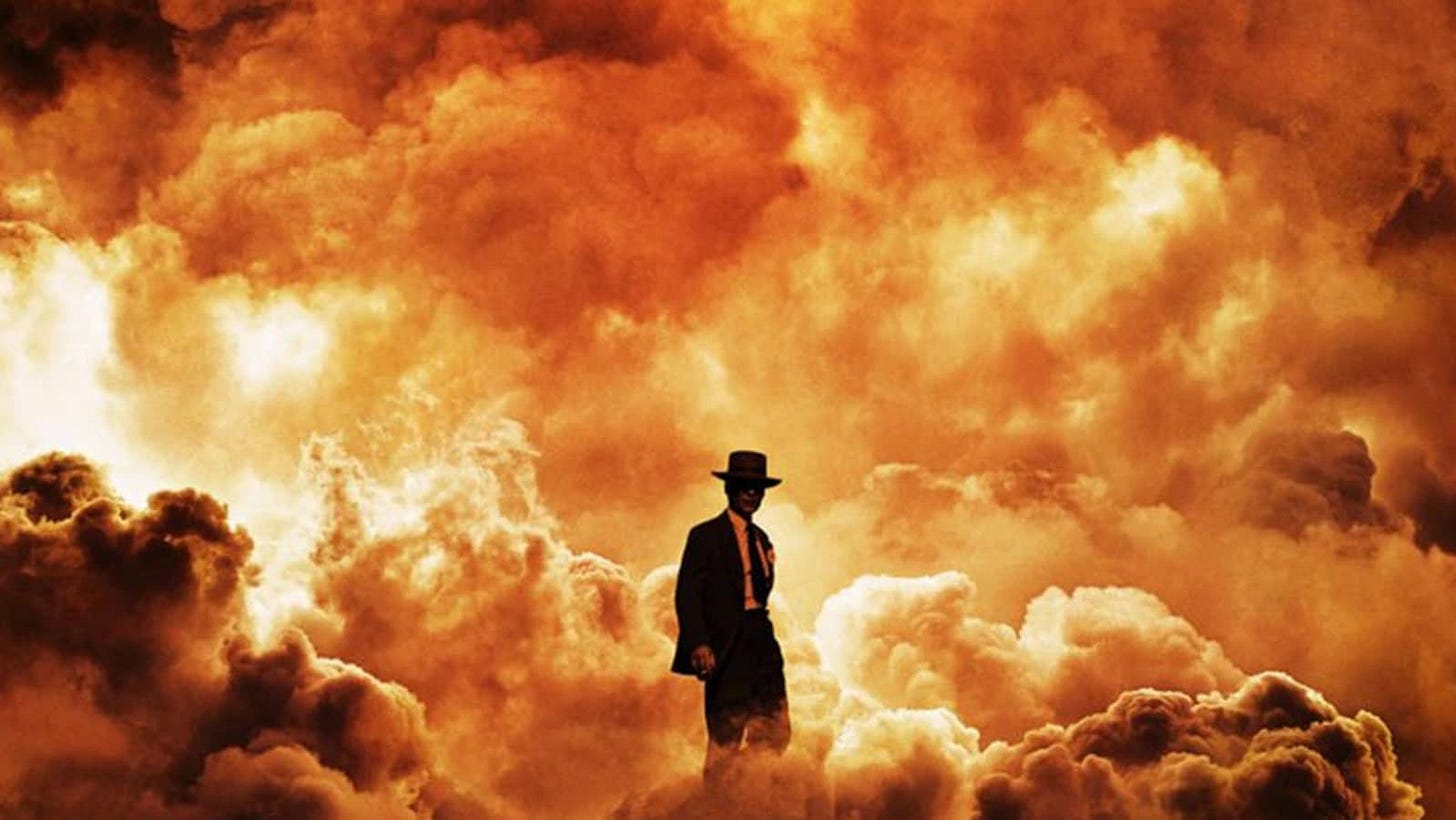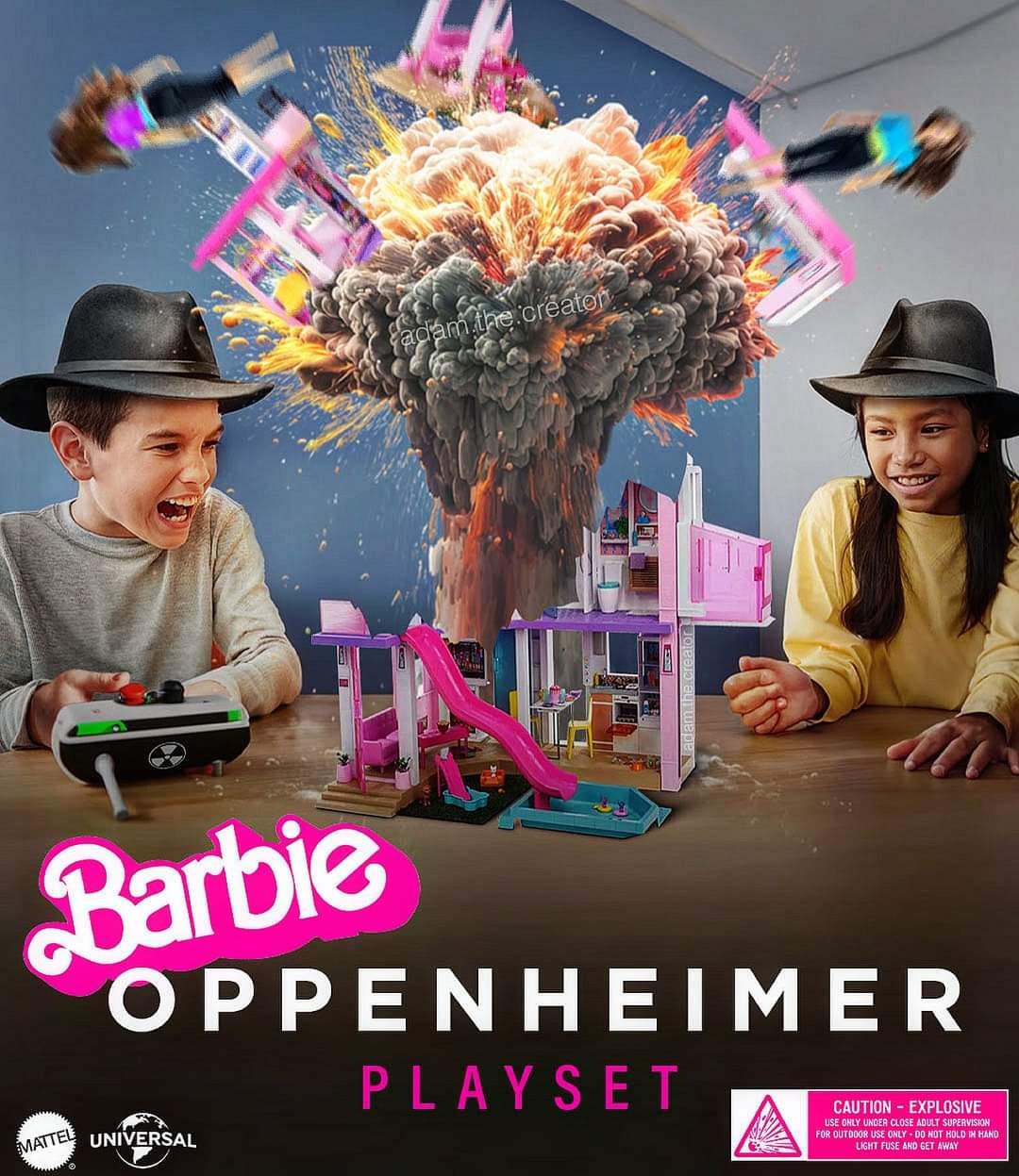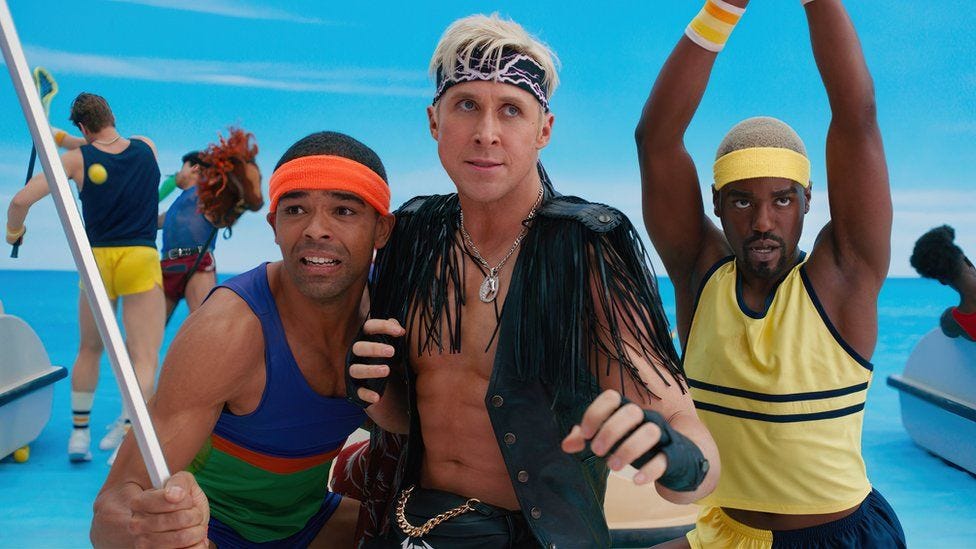
A cultural moment is happening this weekend: Barbenheimer. Greta Gerwig’s Barbie and Christopher Nolan’s Oppenheimer both premiere this weekend and the internet has been on fire about the two simultaneous releases for months. On their faces, the two movies look so dissonant, so opposed, that it almost seems like a deliberate joke by the studios that they’re being released at the same time. In fact, much has been made of the theory that Warner Bros. is releasing Barbie at the same time as Oppenheimer to punish Nolan for leaving Warner Bros. and making his movie with Universal. If that was their goal, it’s not working—between the hype and the heat, theatres are predicting a historically high box office this weekend.1 After all, the last time we had two huge simultaneous releases with two very different audiences was when Dark Knight came out on the same day as Mama Mia! on July 18, 2008. It was “the biggest three-day non-holiday stanza in Hollywood history.”2
To be honest, my favorite part of all of this has been the memes. The internet has given the past few months and it doesn’t look to be taking away any time soon. The bright pink mushroom clouds, Cillian Murphy holding up roller skates, “she is become plastic, the destroyer of worlds”—this is my brand of the apocalypse.
But as previews rolled out it became clear to me that, as dissonant as these two films may seem on their posters, they might be addressing the same thing: Existential dread in the post-WWII 1950s and beyond.
Now, I was always going to see both movies because I’m a sucker for an inspiring story of female empowerment and a bigger sucker for a tortured artist biopic. But when I realized that they might actually be saying the same thing, I booked them back to back.

Before I get into anything else, I’ll say that both are good, if that’s a value that matters to you. They are both filled with star-studded casts—every scene in Oppenheimer seemed to feature a new “omg, that guy is in this too!” for me. Barbie is a fun and funny romp through a fantasy world of modern feminism, though I take issues with the ending. It’s slick and comedic and makes fun of itself in a way that I find endearing. Oppenheimer is, visually, the smarter older brother of Inception—both make interior anguish visible, but where Inception transforms intrusive thoughts into trains barrelling through downtown intersections, Oppenheimer explores anxiety through visual and auditory hallucinations that only Oppenheimer and the viewer experience.
From here on out, there are spoilers.
The plot/premise of Barbie is a less well-known, so here’s a quick rundown: Barbie lives in Barbieland, which is like a parallel dimension to our own. In Barbieland, they believe that Barbies have empowered women in the real world and fixed it so that everyone is equal; they believe Barbieland reflects the real world. Her life is perfect in every way, but if the little girl playing with Barbie is struggling, her worries and anxieties imprint on Barbie and impact her in Barbieland. So when Stereotypical Barbie (Margot Robbie) starts having thoughts of death, she goes to The Real World to help her human who is struggling. Ken tags along and together they discover patriarchy, which Ken loves and brings back to Barbieland, ruining the female-centric idyll. Barbie and her human have to return to Barbieland to save it from the patriarchy, discovering their own strengths along the way.
Both, interestingly, deal with the consequences of living within a community where your life is hugely impacted by people you may not even know. Barbie begins having intrusive thoughts about death because the human playing with her is struggling. Oppenheimer initially believes in pure scientific exercise, only to see his theories used to destroy Hiroshima and Nagasaki. You can do your best to be independent, but you never know how outside forces are going to try to destroy you—this seems to be the message of both movies, or part of their message.
This is about the 1950s when the world—and Americans especially—were reckoning with how interconnected our global society is. The devastation of World War II had terrified everyone and settled onto the social consciousness like so much radioactive fallout. Psychological and behavioral reactions to this were varied. Some people, like Oppenheimer, chose deproliferation advocacy in order to try to protect the future from devastation. Others decided to live solely in the moment because the future suddenly wasn’t assured, giving rise to rampant consumerism, the Swinging Sixties, and more.

Oppenheimer directly addresses this: The movie centers around a hearing in 1954 when J. Robert Oppenheimer was accused of being a Russian spy and lost his security clearance. The emotional crux of the movie is how Oppenheimer feels about his creation. What is his responsibility as an American, as a physicist, as a human? These are the questions the movie tries to answer; we’re wrestling with similar questions related to nuclear power still.
Barbie, existing in its parallel universe and wildly off-base understanding of the real world, is part of our reaction to those questions. Instead of dealing with the terror that these questions can engender, we hide. Barbie the toy was first released in 1959, and though the toy would go on to become a feminist icon of all that women are capable of, it is also irrevocably part of our history of fear and dread. She represents a fictional world we created where women weren’t limited by our gender because that was preferable to the real one. The movie does a great job of showing how the imagined and the real build on one another, inspiring real change, but it can never fix the gap between the imagined and the real. In fact, the goal of the movie is to seal the rupture between their universes, so that the Real World can continue on in their ongoing struggle for equality while Barbieland can go back to being an imaginary paradise.
These movies are the 1950s and 60s, splashed across the big screen with star power, bright colors, and excellent audio mixing.
Our heroes wrestle with their dread in the same way: They take action. If they didn’t we wouldn’t have a story! But their endings are different. Barbie movies to the Real World, choosing to become a real woman (the movie hilariously closes on her excitement to visit a gynecologist for the first time). Oppenheimer quietly accepts the abuse that the paranoid McCarthyistic government of the 1950s heaps on him, waiting for his turn to be lauded again (don’t worry, it comes).
These movies seem to say that these are the options when faced with existential dread:
Commit to action, any action, even if it’s flailing and unwise.
Or, bury your head in the sand. Each movie tries both, to varying success. And both seek returns to the old status quo at the end rather than committing to a new, possibly better, one.
And isn’t that kind of what society has been doing since the 1950s? These movies call into question the utility of feminism, of the United Nations, of progress as a concept. Every character dreads change and faces it with gritted teeth; positive possibilities of change—social, technological—remain unexplored in both Barbieland and Oppenheimer’s America. The title characters alone learn to cope with change and meet it with a brave face, but only on an individual level.
Which is part of what held my attention during both movies. They each deal really interestingly with individual versus social responsibility. Both fight hard to abdicate responsibility for the bad things that occur, but one eventually accepts it while the other leaves everything behind.

Oppenheimer handles the question of responsibility better because that’s what the emotional arc of the movie follows. Throughout the movie, various characters ask if creating the atomic bomb is ultimately a good idea. Oppenheimer himself claims that they have to because if they don’t, someone else will first. This is the argument we always come back to when it comes to nuclear weapons: If we don’t someone else will, and then we won’t be safe. (Americans use the same argument domestically against gun control.) Later, Americans cheer after the bombs are dropped. But the sickening reality of the lasting effects of nuclear exposure quickly comes home to roost, and suddenly people have regrets. Oppenheimer confesses that he feels like he has blood on his hands, and President Truman tells him it was ultimately the military’s decision to drop the bomb, not Oppenheimer’s.3 But is that enough?
Oppenheimer pivots after this, opposing the hydrogen bomb because of the immense destructive power it will unleash—orders of magnitude greater than the atomic bomb. Arguments that someone else will do it even if the US doesn’t suddenly don’t matter. Ethically, we should not even if less morally upstanding actors do.
Nevertheless, a big deal is made about whether or not Oppenheimer regrets the dropping of the atomic bombs on Nagasaki and Hiroshima. The argument seems to be that it was out of his hands, that he couldn’t have stopped them. But there is a moment when he could, a moment that the movie makes a big deal out of: Calculations are revealed that show that setting off an atomic bomb could cause an unstoppable chain reaction that would destroy the entire world. Ultimately, several Very Smart Math Guys™️ calculate that the likelihood of that happening is near zero.
Not zero. Just near zero.
It’s Oppenheimer’s call. He could call off the whole Manhattan Project based on this, he has the influence. He, at the very least, could stall and delay until someone else tries it first, that way if the world is destroyed, it’s not his fault.
He goes forward. After that, I’m never convinced by Truman or anyone else saying that the bomb wasn’t Oppenheimer’s responsibility. And the movie seems to fall on that side of the argument—Oppenheimer worked with others, but he was in charge. He unleashed this terror. I am become Death, the destroyer of worlds.

But Barbie? The movie abdicates all responsibility for the bad things that happen in it, choosing to reinforce a fantasy world that created its own problems in the first place.
Ken falls in love with patriarchal values because Ken doesn’t have a point in the Barbie universe. He was created to be a helpmate of Barbie, her hot boyfriend when she wanted one around, but he has no agency of his own. He doesn’t have a job or a hobby or anything—his whole identity is “beach.” This meaninglessness exists in opposition to Barbies occupying every role in society. When he goes to the Real World, he sees men in control, doing things, having a purpose! He wants that!
And of course he does. His entire existence up to this moment was essentially to look hot and help Barbie. Sound familiar? It’s the entire feminism movement since, I don’t know, the 1860s but with a gender reversal. Every wave of feminism has looked around and basically said, “Hey, it’s super unfair that men do everything and make all the decisions and we’re just here.”
She’s everything. He’s just Ken.
At one point, the humans ask Barbie where Ken lives, and she admits she has no idea. In fact, the Barbies seem to only notice Ken when they need someone to cheer for them or carry them somewhere. No wonder the Kens are unhappy and easily swayed into a sickening patriarchy that harms everyone.
(Remember, Ken does not live in the real world—he has none of the advantages men have in our world. He occupies the same role that women were trapped in pre-feminism, except he isn’t even considered necessary for procreation, since Barbies don’t procreate.)

So what is the movie’s answer to Ken’s dissatisfaction? The Barbies trick the Kens into fighting each other so that they can sneakily restore Barbieland to its female-dominated existence. And then Ken is told to go find himself, to figure out his bliss. The message is that Ken is created differently from Barbie and he needs to find a way to be happy with that. (The Barbies are aware that they have a creator, though they’re not entirely sure who it is.) Sure, he should find his own identity instead of forcing himself to be happy as *just* Barbie’s boyfriend, but there’s no hint that maybe systemic change is needed to make room for him to do that.
I’m disappointed because this is the same argument that men used to keep women in “their place” for centuries. Men spent generations saying that men and women are different because God created women differently, and women needed to find a way to be happy about that without actually changing anything about society. Men had done society right, and women just needed to figure out how to be happy within it.
[A pause while the writer retches into the nearest trash can.]
At the end of the movie, Barbieland still doesn’t have a place for Ken because they’ve restored it to the pre-Real World rupture status quo. (The major change is that Weird Barbie is now an accepted member of their society, not just their shunned witch they fear until they need medical treatment.4) So where is he supposed to go to establish his own identity? How is he supposed to be sustainably happy within a society that sees him as fundamentally less than Barbie?
I had hoped that the movie was going to realize that a society that gives preferential status and treatment to one sex or gender over another is always going to be fundamentally inequitable. Instead, it leaves us with the argument that Kens weren’t created for anything and that that’s Ken’s problem to solve alone. Barbie takes no responsibility for the world it has created nor the problems that exist within it.
Is Barbie trying to be satire? Is it trying to use irony to point out how flawed society still is? Maybe, but then it doesn’t go far enough to be obviously satirical. If anything, I think this will be read by men’s rights folks as proof that women want a society where men don’t have a voice, but that’s not what modern feminism is about.
Barbie and Oppenheimer are both movies about our past, about our dread of living in a changing world that none of us can individually control. But neither says much about our future, which I found disappointing. They seem to suggest that we’re still not far enough away from the events of the 1940s and 50s to objectively examine them or their impact on today’s world. They examine power structures, individual versus social responsibility, and societal ills, but their answers to these issues remain incomplete. Individual dread is resolved for our heroes, but the larger issues that triggered their dread are not. Acknowledging a problem exists, while important, isn’t the same as solving it; ultimately, neither movie offers a balm for our existential dread.
📚 Bibliography
Balch, Peggy. “Research Guides: Witchcraft, Women & the Healing Arts in the Early Modern Period: Wise-Women & Cunning Folk Healers.” Accessed July 21, 2023. https://guides.library.uab.edu/c.php?g=1048546&p=7609198.
Bella, Timothy. “The Atomic Bombings Left Oppenheimer Shattered: ‘I Have Blood on My Hands.’” Washington Post, July 21, 2023. https://www.washingtonpost.com/history/2023/07/21/oppenheimer-truman-atomic-bomb-guilt/.
Busis, Hillary. “Einstein and Oppenheimer’s Real Relationship Was Cordial and Complicated.” Vanity Fair, July 21, 2023. https://www.vanityfair.com/hollywood/2023/07/oppenheimer-einstein-movie-real-life.
D’Alessandro, Anthony. “‘Barbie’ Glams Up Summer With $150M+ Opening, ‘Oppenheimer’ Excites $75M+ – Box Office Update.” Deadline, July 21, 2023. https://deadline.com/2023/07/box-office-barbie-oppenheimer-barbenheimer-1235443828/.
Dorn, Lori. “Barbenheimer, A Mashup of ‘Barbie’ and ‘Oppenheimer.’” Laughing Squid (blog), July 19, 2023. https://laughingsquid.com/barbenheimer-the-movie/.
Grove, Martin A. “Exit Polls Show Great Legs for ‘Mamma Mia!’” The Hollywood Reporter, July 22, 2008. https://www.hollywoodreporter.com/business/business-news/exit-polls-show-great-legs-116124/.
HuffPost. “The French Poster For ‘Barbie’ Just Went Viral For A Very Naughty Reason,” June 23, 2023. https://www.huffpost.com/entry/french-barbie-poster-ken-naughty_n_6495b8dfe4b02f808ab57ca1.
Jacobs, Matthew. “The Battle of Barbenheimer Is Mamma Mia! Vs. The Dark Knight All Over Again.” Vulture, July 14, 2023. https://www.vulture.com/2023/07/barbie-oppenheimer-is-mamma-mia-vs-the-dark-knight-redux.html.
“June 29, 1954: Oppenheimer’s Security Clearance Revoked.” Accessed July 21, 2023. http://www.aps.org/publications/apsnews/200106/history.cfm.
“Post-War Consumerism - Women & the American Story.” Accessed July 21, 2023. https://wams.nyhistory.org/growth-and-turmoil/cold-war-beginnings/post-war-consumerism/.
Treisman, Rachel. “What to Know about the ‘Barbenheimer’ Double Feature Frenzy.” NPR, July 21, 2023, sec. Movies. https://www.npr.org/2023/07/21/1189062921/barbie-oppenheimer-barbenheimer-movie-double-feature.
US EPA, OAR. “Radioactive Fallout From Nuclear Weapons Testing.” Overviews and Factsheets, November 30, 2018. https://www.epa.gov/radtown/radioactive-fallout-nuclear-weapons-testing.
Washington Post. “The Story behind Barbenheimer, the Summer’s Most Online Movie Showdown.” July 14, 2023. https://www.washingtonpost.com/business/2023/07/14/barbenheimer-barbie-vs-oppenheimer/4ffebcf6-2269-11ee-8994-4b2d0b694a34_story.html.
“World’s Most Dangerous Toy? Radioactive Atomic Energy Lab Kit with Uranium (1950) - Bulletin of the Atomic Scientists.” Accessed July 21, 2023. https://thebulletin.org/virtual-tour/worlds-most-dangerous-toy-radioactive-atomic-energy-lab-kit-with-uranium-1950/.
Anthony D’Alessandro, “‘Barbie’ Glams Up Summer With $150M+ Opening, ‘Oppenheimer’ Excites $75M+ – Box Office Update,” Deadline (blog), July 21, 2023, https://deadline.com/2023/07/box-office-barbie-oppenheimer-barbenheimer-1235443828/.
Martin A. Grove, “Exit Polls Show Great Legs for ‘Mamma Mia!,’” The Hollywood Reporter, July 22, 2008, https://www.hollywoodreporter.com/business/business-news/exit-polls-show-great-legs-116124/.
Timothy Bella, “The Atomic Bombings Left Oppenheimer Shattered: ‘I Have Blood on My Hands,’” Washington Post, July 21, 2023, https://www.washingtonpost.com/history/2023/07/21/oppenheimer-truman-atomic-bomb-guilt/.
Peggy Balch, “Research Guides: Witchcraft, Women & the Healing Arts in the Early Modern Period: Wise-Women & Cunning Folk Healers,” accessed July 21, 2023, https://guides.library.uab.edu/c.php?g=1048546&p=7609198.




This is an uncomfortable amount of dread for the time of night I read this.